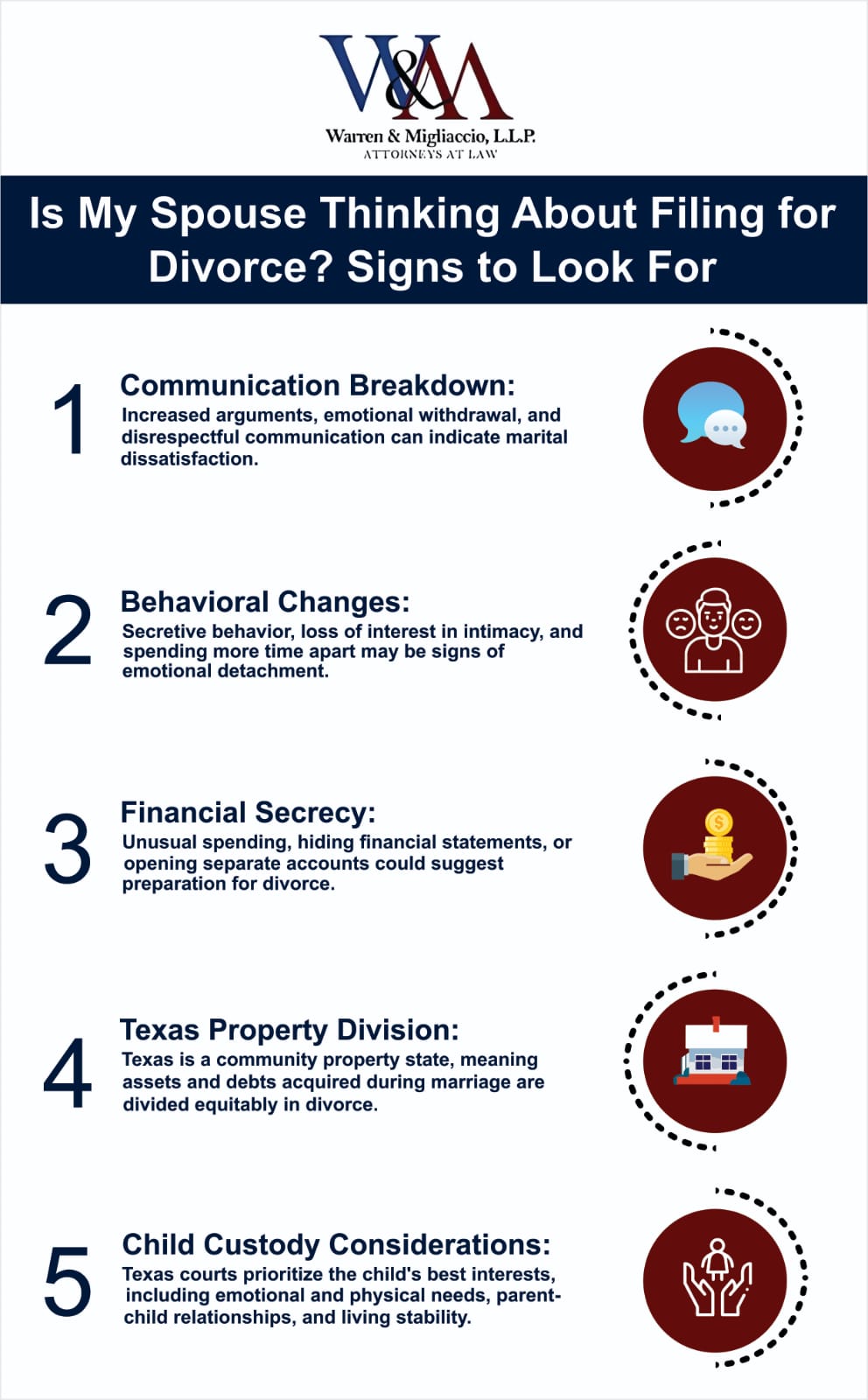At Warren & Migliaccio, we see people going through divorce every day and one of the most common things that we hear is that people feel blindsided by their partner’s decision to file for divorce. We understand that navigating the emotional turmoil of a potential divorce can be incredibly difficult. Often, when a spouse is considering ending the marriage, their behavior will change in subtle and not-so-subtle ways that can be picked up on if you know what signs to look for. You may even find yourself wondering, “Is my spouse thinking about filing for divorce? Signs to look for can help you understand the situation better.”
While it’s impossible to definitively know what your spouse is thinking or planning, there are often signs that a divorce may be on the horizon. This blog post explores some of the key behavioral and communication changes you might observe in your spouse that could indicate they’re contemplating divorce in Texas. It’s important to remember that these signs alone are not always a guarantee of impending divorce, but they can serve as a wake-up call to address underlying issues within the marriage.
If you are going through a divorce, or want to discuss how to protect yourself in the event your partner may file soon, you can call us at Warren & Migliaccio for a free consultation at (888) 584-9614.
Communication Breakdown:
Open and honest communication is the cornerstone of any healthy relationship. If you notice a significant shift in your communication patterns with your spouse, it could be a sign of trouble. Here are some red flags to watch for:
- Increased arguments and negativity: Constant bickering, negativity, and a critical tone towards you can signal dissatisfaction with the marriage.
- Stonewalling and withdrawal: Does your spouse shut down conversations, refuse to discuss problems, or become emotionally distant? This behavior indicates a lack of willingness to work through issues.
- Contempt and disrespect: Sarcasm, name-calling, and disrespectful communication are toxic and create a hostile environment.
- Lack of interest in your life and feelings: Does your spouse seem uninterested in your day-to-day life, accomplishments, or emotional well-being? This emotional detachment can be a sign of growing disconnection.
 Changes in Behavior and Detachment:
Changes in Behavior and Detachment:
Sometimes, a spouse’s actions speak louder than words. Be mindful of significant changes in their behavior that could indicate a shift in their priorities or emotional state. Here are some areas to consider:
- Increased secretiveness: Are they suddenly more secretive about their phone use, finances, or whereabouts?
- Changes in social habits: Does your spouse spend less time with you and more time working late, socializing with friends individually, or engaging in new hobbies alone?
- Loss of interest in intimacy: A significant decrease in physical affection or intimacy can be a sign of emotional withdrawal or potential infidelity.
- Neglecting personal appearance: Does your spouse seem to have let themselves go in terms of their physical appearance? This could be a sign of depression, disinterest in the relationship, or a desire to appear more attractive to someone else.
Financial Secrecy and Altered Spending Habits:
Financial matters are often a point of contention in troubled marriages. Here are some financial changes that could suggest your spouse is preparing for divorce:
- Increased spending or unexplained financial transactions: Are there unusual charges on your credit card statements or joint bank accounts?
- Opening new bank accounts or credit cards in their own name: This could be a sign that they’re establishing separate finances in preparation for divorce.
- Hiding financial statements or tax documents: Are they suddenly reluctant to share financial information that was previously transparent?
- Making major financial decisions without consulting you: This could be a way of exerting control over finances or hiding assets in anticipation of a divorce.
Texas Property Division Laws and Considerations:
If you suspect divorce is on the table, it’s crucial to familiarize yourself with Texas property division laws. Texas is a community property state, which means all property acquired during the marriage (with some exceptions) is considered marital property and subject to division upon divorce.
Here are some key points to remember:
- Separate property vs. marital property: Separate property generally refers to assets acquired before the marriage or through inheritance or gift during the marriage. Marital property encompasses all income and property acquired during the marriage (excluding separate property).
- Character of property: In some cases, tracing the origin of funds used to acquire an asset can be crucial in determining whether it’s considered separate or marital property.
- Debt division: Just like assets, all debts incurred during the marriage are also considered marital debts and will be divided by the court.

Key signs that may suggest your spouse is thinking about divorce—communication breakdown, behavioral shifts, financial secrecy, and legal considerations in Texas.
Texas Child Custody Laws and Considerations:
If you have minor children, child custody arrangements are a significant concern during a divorce. Texas courts prioritize the “best interests of the child” when determining custody arrangements Texas Family Code § 151.002. There are two primary types of child custody in Texas:
- Conservatorship: This term replaces “custody” in Texas family law. There are different types of conservatorship arrangements, including:
- Joint Managing Conservatorship: Both parents share the legal decision-making authority regarding the child’s upbringing, such as education, healthcare, and religious instruction. However, one parent may be designated as the primary residential conservator, meaning the child lives with them the majority of the time.
- Sole Managing Conservatorship: One parent is awarded all the legal decision-making authority and the child resides primarily with them. This is typically granted in situations where the other parent is deemed unfit or poses a risk to the child’s safety or well-being.
- Possession Schedule: This outlines the specific periods each parent spends with the child. It’s crucial to have a well-defined possession schedule to minimize conflict and ensure stability for the child.
Factors Considered in Determining Child Custody:
Texas courts consider several factors when determining the most appropriate child custody arrangement, including:
- The child’s emotional and physical needs: The court will prioritize the child’s age, health, emotional well-being, and developmental needs.
- The relationship between the child and each parent: The court will evaluate the strength and quality of the existing relationships between the child and each parent.
- The ability of each parent to provide for the child’s needs: This includes factors like financial stability, parenting skills, and ability to provide a safe and nurturing environment.
- The preference of the child (if 12 years of age or older): While not the sole determining factor, the court may consider the wishes of a child who is at least 12 years old regarding which parent they prefer to live with Texas Family Code § 153.073.
- The stability of the proposed living arrangements: The court will consider the stability of each parent’s proposed living situation, including factors like proximity to schools and the child’s current social network.
- Parental history of domestic violence or child abuse: Any past incidents of domestic violence or child abuse will be heavily considered by the court. They can significantly impact the child’s safety and well-being.
Importance of Consulting an Attorney:
Texas child custody laws can be complex, and the specific details of your case will significantly influence the court’s decision. If you are facing a potential divorce and have children, consulting with an experienced family law attorney is crucial. An attorney can advise you on your legal rights and options. He guides you through the child custody process and advocate for you and your child’s interests.
What are common reasons that a partner might file for divorce?
In addition to behavioral signs, knowing common reasons for divorce in Texas can provide insight into your spouse’s motivations. Here are frequent grounds for divorce in the state:
-
Insupportability: Often cited when couples grow apart emotionally, making it impossible to live together. Texas Family Code § 6.001(a)(1) allows for this no-fault option, recognizing the marriage as irretrievably broken.
-
Cruel Treatment: If your spouse inflicts mental or physical cruelty that makes living together unbearable, it may qualify under Texas Family Code § 6.001(a)(2). Evidence is required, and minor disagreements don’t suffice.
-
Adultery: Proof of infidelity, such as messages or witness testimony, can serve as grounds under Texas Family Code § 6.001(a)(3).
-
Living Separate and Apart: If you’ve lived separately for at least three years with the intent to end the marriage, this can qualify under Texas Family Code § 6.001(a)(4).
-
Conviction of a Felony: A felony conviction resulting in confinement for at least a year may be grounds under Texas Family Code § 6.001(a)(5).
-
Mental Illness: If your spouse has been in a mental hospital for at least three years and recovery seems unlikely, it may be grounds under Texas Family Code § 6.001(a)(6), though this is rarely used.
-
Financial Issues: Disputes over spending and financial goals can erode trust and create stress.
-
Communication Breakdown: Emotional withdrawal, refusal to discuss issues, and constant criticism can lead to a hostile environment.
- Infidelity: Extramarital affairs are a devastating blow to trust and intimacy within a marriage. If you discover your spouse has been cheating, it can be incredibly difficult to move forward and rebuild the relationship.
- Substance Abuse: Alcoholism, drug addiction, or gambling problems can significantly impact a marriage. The addictive behavior can lead to financial strain, emotional neglect, and even physical abuse.

Considering Reconciliation:
If you suspect your spouse is considering divorce but still have feelings for them and a desire to save the marriage, there are options available. Consider attending couples therapy to address underlying issues and work towards reconciliation.
It’s important to remember that every marriage is unique, and the reasons for divorce can vary greatly. If you’re concerned about the future of your marriage, consulting a qualified family law attorney can prove valuable. An attorney can assess your situation, explain your legal rights and options. He can help you navigate the complexities of divorce in Texas.
Contact A Texas Divorce Lawyer Today To Learn Your Options
If you recognize some of the signs discussed in this blog post, it doesn’t necessarily mean your marriage is doomed. Open and honest communication with your spouse is crucial. Consider couples therapy to address underlying issues and explore the possibility of reconciliation.
However, if you’ve exhausted all efforts and believe divorce may be the only option, it’s important to understand your legal rights. The experienced family law attorneys at Warren & Migliaccio, L.L.P. are here to guide you through this challenging time. We understand the emotional and financial complexities of divorce and are committed to advocating for your best interests.
Schedule a Free Consultation Today
If you have questions or concerns about your situation, contact us today for a free consultation. We can discuss your specific circumstances and provide you with tailored legal advice. Call us at (888) 584-9614 to learn more about our family law services. We are here to help you navigate the legal aspects of divorce with compassion and understanding.

